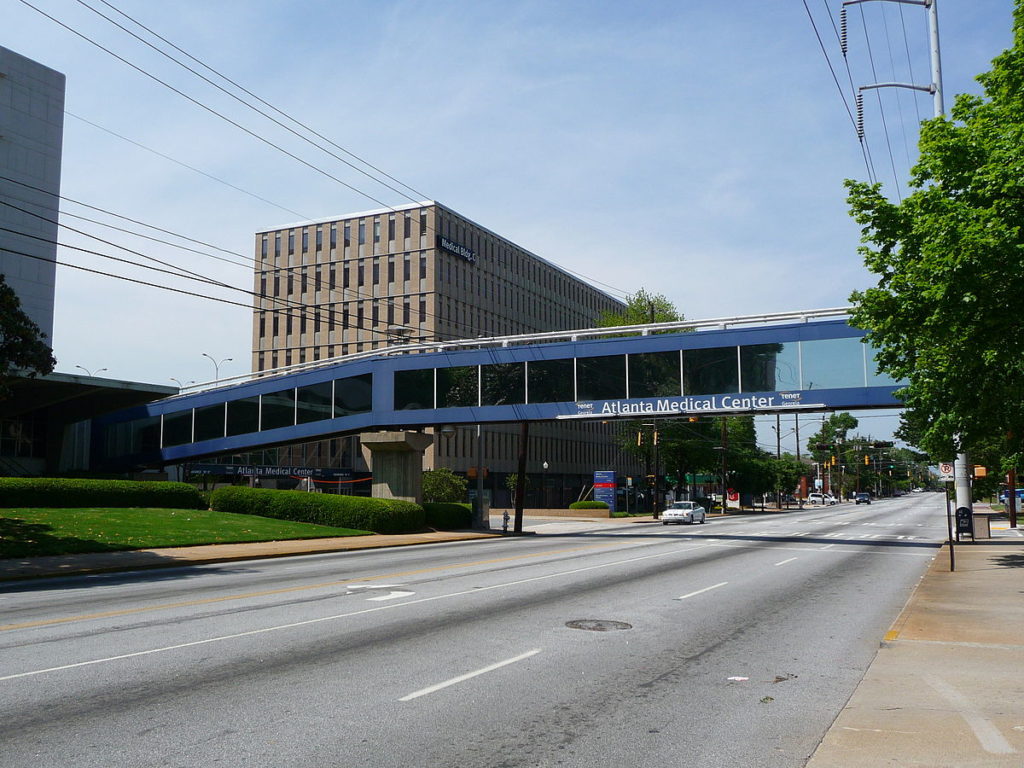Owners have recently announced that the Atlanta Medical Center — which had one of only two Level 1 trauma centers in Atlanta — is soon to be shut down due to less than expected profits. Neither the workers of AMC nor the City of Atlanta were notified. Many across Georgia, who see this for the health care crisis it is, are outraged. The commodification and privatization of health care under the capitalist system puts this basic right to health and life still far out of reach for many.
What is Atlanta Medical Center?
Atlanta Medical Center was founded in 1901 under the name Georgia Baptist. In 2016, Wellstar purchased five hospitals from Tenet Health, including AMC and Atlanta Medical Center South.

On September 1, Wellstar announced that AMC will close on November 1. Wellstar cited monetary losses as the reason for the closing. This announcement comes just months after Wellstar announced AMC South’s Emergency Room will close and inpatient services will be transitioned to AMC. Both AMC and South serve low-income areas with many historic Black neighborhoods nearby, including the Old Fourth Ward. AMC had one of only two Level 1 Trauma Centers in Atlanta and served as a primary overflow for Atlanta’s primary hospital, Grady.
Uncertainty hangs over the city of Atlanta
Last year alone, AMC’s ER served over 50,000 low-income patients. In a state like Georgia where 1.5 million people are uninsured — 200,000 in Dekalb and Fulton counties — taking AMC out of the equation is a death sentence. Georgia is one of 24 states in the country that opted out of Medicaid expansion in 2012 under a Supreme Court decision that gave states the right to opt out of Obamacare. The majority of uninsured in both counties are Black.
To protect the identities of Wellstar employees, all quotes are anonymous.
An AMC employee told Liberation News that one of the victims of a recent shooting was taken to AMC because Grady’s ER was full: “If he wasn’t brought here, the next closest Level 1 Trauma Center would be in Macon and he wouldn’t have survived.”
Whereas cities of comparable size have multiple Level 1 Trauma Centers, Atlanta will be down to one as of November 1. Even while facing unemployment, workers are worried about the community: “My heart goes out to [the patients], Grady is over capacity.”
Beyond that, AMC has existed in this community for over 100 years and many of the businesses in the area cater to the hospital. Just across the street are a drug store and a uniform supply store which specializes in selling scrubs. As an employer of almost 3,000 people, the loss of AMC will be a wound to the economic wellbeing of an already suffering area.
‘I have witnessed workers crying in the halls‘
News of the closing leaked to the media prior to the September 1 announcement. Many of the 2,800 AMC employees learned of the closing through local news. “We found out from the TV in our lobby breaking news. They didn’t even tell us straight,” said one AMC employee. Another, a physician’s assistant who had been with the hospital for a decade, said he learned of the closing through the local paper.
There appears to be no transition plan in place. While some employees have been offered positions at other facilities, the fate of the majority seems very uncertain. Two food service workers said they had already been given separation papers. “A lot of people will be out of work … a lot of older people, where will they go? It’s not fair,” one said. “What about the single parents who work and live around here? We need a voice because this ain’t right,” he continued.
While many of the employees do live in the surrounding neighborhoods, many others live south of the city and already commute miles and miles every day. A physician’s assistant mentioned that of the few employees to get offers at other Wellstar locations, many reported that the offers made were 80 to 90 miles from their home.
When asked about the closing, a worker at another Wellstar facility said, “It’s not fair for those people — some have been there for over 15+ years. That’s a lot of people’s main income.” Dread hangs over the hospital staff, as reported by an AMC worker, “I have witnessed workers crying in the halls.”
Bracing for Impact: a public health emergency
Across Atlanta, people are shocked. Grady Hospital in its statement said, “This decision by Wellstar to abandon the community will further strain our operations, particularly our emergency room, as more patients will present with medical needs.” Further in the statement, Grady pointed to an increase in visits to Grady’s ER following the closing of AMC South, and that both of the hospitals Wellstar plans to close this year serve underserved communities.
The President of Medical Staff at AMC said the closing will create “a public health emergency.”
According to an open letter from Atlanta’s mayor to Wellstar’s CEO, the city had no warning about the closing. In the letter, Mayor Dickens demanded an explanation for the closing and lack of communication. He said the city of Atlanta could have assisted in the finances, but that Wellstar did not consult with him. He ended by demanding a meeting with key Wellstar leadership members by September 16.
The picture painted by Wellstar’s announcements would have one thinking Wellstar is bleeding money. According to Atlanta Business Chronicle, however, Wellstar continues to operate at large profits. Wellstar has almost $3 billion in net assets, even considering losses at AMC. It remains the largest health care system in Georgia.
Wellstar is designated as a nonprofit organization, creating the assumption that the hospital is a charity and is a not-for-profit entity. However, the majority of the ten most profitable hospitals in the United States are so-called nonprofits. Non-profit hospitals do not have to pay taxes due to tax exemptions. These “nonprofits” do make profit, and plenty of it.
The principles that guide a nonprofit like Wellstar are the same that guide any business under capitalism, and that is maximizing profits at any cost and avoid being forced out of business by its competition.
AMC serves a much poorer area than Wellstar’s other hospitals, bringing in less revenue than is expected by those at the top in the company. In contrast, Alpharetta is a much wealthier area of operation. Wellstar purchased Alpharetta’s North Fulton Hospital at the same time as AMC. In 2020, it opened Avalon Health Park, a 40,000 square foot facility, just six minutes away from North Fulton Hospital. A health park is a facility that offers a range of outpatient services from urgent care to radiology. The decision to keep its North Fulton Hospital running while shutting down AMC shows that the Wellstar hospital system is bound to its profit margins. There is only one reason Wellstar has chosen to close AMC, and that is the desire to make tens of millions more dollars.






